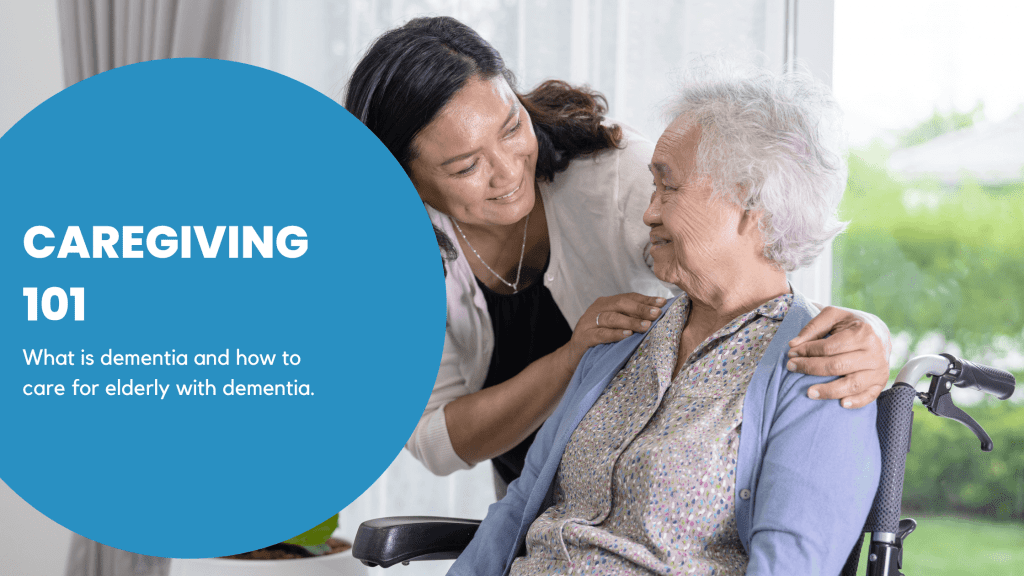Caregiving 101: Dementia
- Medicalassistance4u
- February 5, 2023
- Caregiving, Dementia, Mental Health

What is dementia?
Dementia is one of the 3 common mental health disorders among the elderly.
It is a general term for the impaired ability to remember, think or make decisions that affect daily life.
It is not part of the normal ageing process. While age-related memory changes are normal, most adults do not develop dementia in their lives as they age.
Dementia is caused when nerve cells and their connections in the brain are damaged or lost. Depending on the underlying cause, dementia can be treatable. While neurodegenerative dementias (like Alzheimers) have no cure, medicine can be used to protect the brain and manage symptoms.
Types of dementia and their symptoms
Type of dementia | Symptoms |
Alzheimer’s disease | Trouble remembering recent events; i.e. conversations that occurred minutes or hours ago Later in the disease:
|
Vascular dementia | Symptoms vary depending on the area and size of the brain impacted, but symptoms increasingly get worse as the individual suffers from more strokes. |
Lewy body dementia |
|
Frontal-temporal dementia |
|
Mixed dementia | When more than one dementia is present in the brain, symptoms may overlap. |
Dementia is a general term and symptoms widely vary among people. Generally, people with dementia experience trouble with:
- Memory
- Attention
- Communication
- Reasoning, judgement and problem solving
- Visual perception (beyond the typical age-related changes in vision)
1. Alzheimer’s disease
This is the most common type of dementia, accounting for 60% to 80% of all cases.
Symptoms include trouble remembering recent events; such as conversations that happened just minutes or hours ago.
These symptoms usually show later in the disease:
- Difficulty remembering more distant memories
- Difficulty with walking
- Difficulty with talking
- Personality changes
2. Vascular dementia
This type of dementia refers to changes in memory, thinking and behaviour caused by conditions that affect blood vessels in the brain.
10% of vascular dementia cases are linked to strokes or other conditions that affect blood flow to the brain.
While symptoms vary depending on the area and size of the brain impacted, the symptoms get progressively worse as the individual suffers from more strokes.
3. Lewy body dementia
Lewy body dementia occurs when brain chemicals are affected by abnormal deposits of the protein, alpha-synuclein.
Besides typical symptoms of memory loss, symptoms of this form of dementia also include movement or balance problems such as stiffness or trembling.
Other symptoms experienced may be
- Change in alertness; such as daytime sleepiness, confusion, staring spells
- Trouble sleeping at night
- Visual hallucinations
4. Frontal-temporal dementia
With this type of dementia, damage to neurons in the frontal and temporal lobes of the brain often lead to changes in personality and behaviour.
Other symptoms include problems with language skills, such as difficulty speaking or understanding.
5. Mixed dementia
It is possible that more than one type of dementia is present in the brain, especially in people 80 years old and above.
In these cases, dementia symptoms can overlap or be more prominent than the other. As such, it is not always obvious at first that a person has mixed dementia.
Reversible causes
Sometimes, dementia may have underlying causes like a side effect of medication, increased pressure in the brain, vitamin deficiency and/or thyroid hormone imbalance.
Patients exhibiting signs of dementia should be screened for reversible causes.
Caring for elderly with dementia
When caring for a loved one with dementia, it is normal to feel emotionally and physically taxed. Most caregivers experience a wide range of emotions. It is important to recognise such feelings in yourself and learn to process them healthily.
Some emotions that may arise during caregiving are
- Guilt
- Anger and frustration
- Loneliness and grief
In order to care for patients suffering from dementia with compassion and patience, we need to first be gentle with ourselves.
1. Be proactive in asking for help
Do not be afraid to ask for help and accept help when offered.
Guide family and friends through the caregiving process and communicate what you need them to do.
2. Be realistic and manage expectations
Dementia patients do not all respond to treatment in the same way. No matter the response and outcome, know that you are doing the best you can.
3. Stay positive
While you may not have full control over the circumstances, stay open-minded and take each day as it comes.
4. Take care of yourself
Take the necessary breaks and care to avoid yourself burning out. Remember to eat, exercise and rest.
5. Communicate creatively
Those suffering from dementia may find they cannot properly express themselves like they used to.
Find different and creative ways to communicate with them and encourage their response. This could include showing them pictures, playing songs and reading stories.
6. Keep learning about the illness.
Gaining understanding and learning about dementia will help as the disease progresses. With the knowledge you have, you are better equipped to manage your expectations and feelings as symptoms become more severe.
At Medical Assistance4u
Our team of medically trained staff at Medical Assistance4u can provide you with consultation services to assist you in providing good elderly care and finding the right assistive tool and medical equipment.
We also provide services like installation and repair services, relocation and disposal services for bulky medical equipment, home care services and transport for your wheelchair-bound loved ones.

